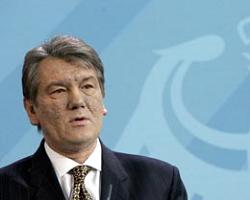
PARTY OF REGIONS CONTINUES TO PLAY ON YUSHCHENKO’S WEAKNESSES
Publication: Eurasia Daily Monitor Volume: 3 Issue: 110
By:

The Ukrainian opposition, entrenched in the south and east of the country, continues to score points in its tug-of-war with Kyiv. More councils are raising the status of the Russian language in defiance of the constitution; regional governors appointed by Yushchenko after the Orange Revolution of 2004 are leaving office one by one; Kyiv’s right to hold multinational military exercises in the south of Ukraine is being questioned; and certain local councils have proclaimed “NATO-free areas,” defying the government’s Euro-Atlantic integration slogans.
With the city and regional councils dominated by the Party of Regions (PRU), President Viktor Yushchenko has been left to fight alone, as parliament has failed to start to work on time, the Constitutional Court is not operational in the absence of a quorum, the Cabinet formally resigned before the new parliament briefly convened on May 25, and it is not clear when a new one will be formed and by whom (see EDM, May 31).
On May 30, the eastern Luhansk city council proclaimed Russian the regional language, joining a club of several other eastern and southern councils that have passed similar legislation in recent months; Kyiv has accused them of “language separatism.” In several cases, the local prosecutors filed protests against the councils’ language decisions, but this only prompted more defiance. On May 31, the Kharkiv city council rejected the city prosecutor’s appeal against raising the status of Russian by 77 votes to 16. The PRU-dominated Kharkiv region council followed the example of their party colleagues from the city council and proclaimed Russian the regional language in a vote of 107 to 25 on June 3.
Adding insult to injury, also on June 3, Kharkiv region’s council voted no confidence in Yushchenko’s appointee, regional governor Arsen Avakov. The breakdown of the voting must have been especially humiliating for Yushchenko — 105 to one, with three abstentions. Yushchenko had earlier dismissed several Orange governors in the PRU-dominated regions (see EDM, May 17), but the fate of Avakov shows that the PRU was still not satisfied.
On May 30 Yushchenko personally went to Donetsk to introduce the new regional governor to the local captains of industry. Yet Volodymyr Lohvynenko hardly needed any introduction, as, unlike his predecessor, Vadym Chuprun, he is a member of the local elite. Yushchenko used the opportunity to admonish Donetsk — the PRU’s stronghold — for “the so-called regional language.” “No such status is stipulated in Ukrainian laws or the constitution,” he said. “That is why if we talk about language status, this is not up to local governments to decide.” This admonition had no effect on his opponents, who continue to argue that their actions have been in line with the European Charter for Minority or Regional Languages, which Ukraine adopted. On June 5, the Donetsk region council, in a gesture of defiance, proclaimed June 6 “Russian Language Day.”
It is interesting, however, that on the same day the same council, in which the PRU holds 80% of the seats, refused to back an initiative from the radical anti-Western Natalia Vitrenko Bloc to proclaim Donetsk “a NATO-free area.” In the wake of the more than a week of protests against Kyiv’s plans to hold a Ukraine-U.S. peacekeeping exercise in Crimea (see EDM, June 2, 5), neighboring Luhansk region’s council called on the region’s town councils to proclaim “NATO-free areas.” Crimea was proclaimed such an area by the local legislature on June 6.
The language rulings and the anti-NATO protests do not just coincide in time, but they look like links in the same chain, the pro-government 1+1 TV noted in its weekly analytical program on June 4. The PRU demonstrates its strength to Yushchenko by all means available to it in the Russian-dominated regions where anti-West sentiment prevails. On the one hand, the PRU still hopes to jump on the government coalition train; on the other hand, it mobilizes its electorate for a repeat parliamentary election, which is possible if no government coalition is formed this summer.
The fiercely anti-West leftists like Vitrenko play the leading role in the anti-NATO protests, while the PRU ostentatiously distances itself from the radical elements, signaling to Yushchenko that compromises are possible on certain conditions. Yushchenko’s preferred coalition partners, however, have so far offered little support to him. The respectful pro-government weekly Zerkalo nedeli has rebuked the Yulia Tymoshenko Bloc and the Socialists for “silence” and quoted its sources as saying that certain members of Tymoshenko’s party had even offered support to the anti-American protesters in Feodosiya. It should be noted that Tymoshenko has always been coy about support for Yushchenko’s pro-NATO course, and the Socialists openly reject it. Judging by recent statements by the Socialists’ main negotiator in the ongoing coalition talks, Yosyp Vinskyy, this has been one of the main stumbling blocks in the talks so far.
(UT1 TV, NTN TV, May 30; Interfax-Ukraine, May 30, 31, June 2; ICTV, Zerkalo nedeli, June 3; 1+1 TV, June 4-6)




